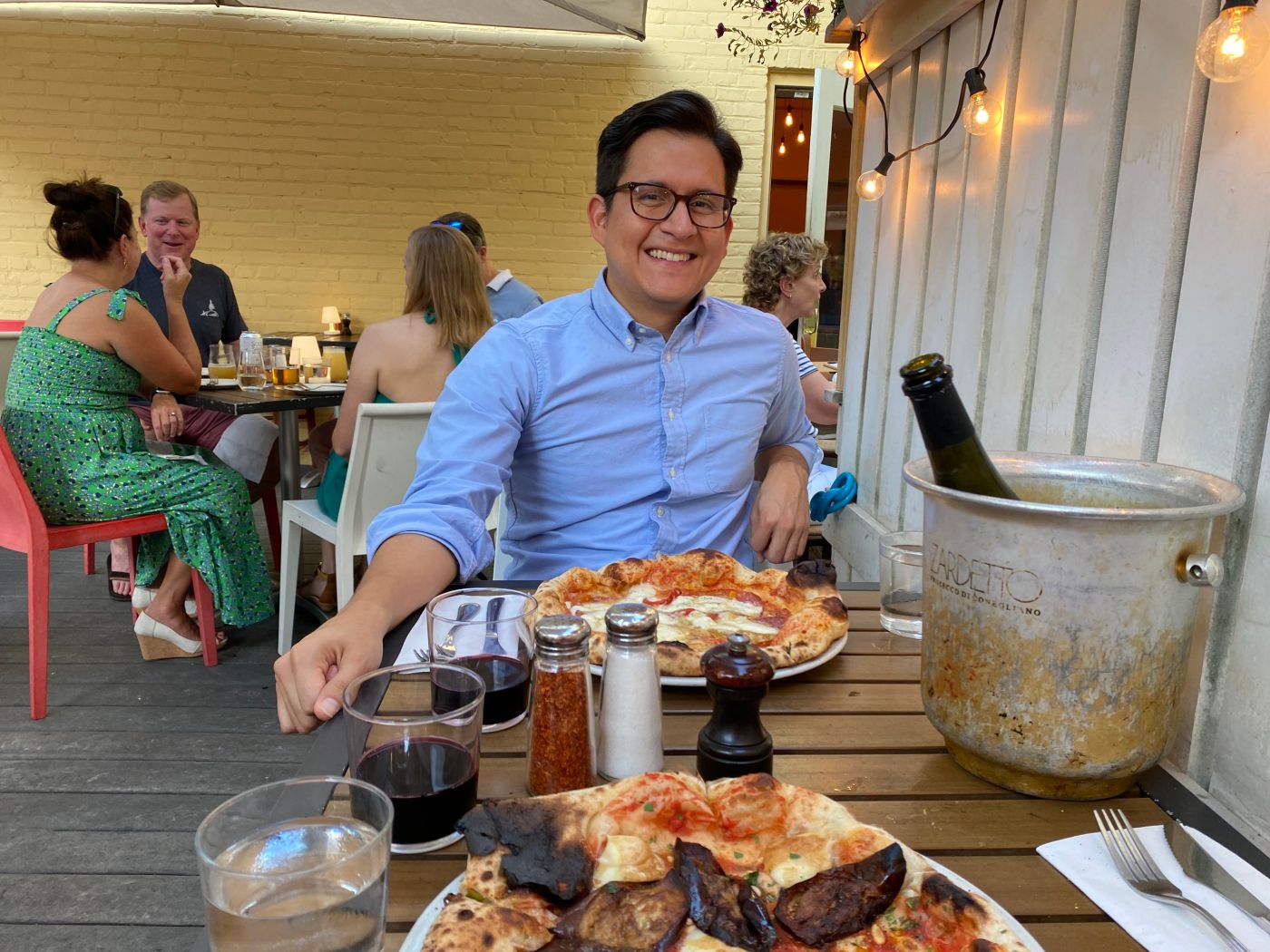Dear Dispatch readers,
First of all, huge thanks for being members! I know we say it all the time, but our work really wouldn’t be possible without your support.
More personally, thank you for throwing some questions my way. To kick things off, since some of you were interested, let me say a little about the place where I was born and the place where I grew up.
Mexico City and Chesapeake
JohnM asked about the circumstances that brought my family to the U.S., and Jack very nicely commented that “It’s gotta be a good story.” I think it is! But it’s more understated than people generally expect.
The short version is pretty straightforward: My father’s company transferred him to Suffolk, Virginia, when I was 10 years old, and we (my two younger sisters, my parents, and I) ended up settling in the adjacent Chesapeake. I spoke English when we moved—courtesy of the bilingual Opus Dei school in Mexico City—so the language barrier was minimal. By and large, Chesapeake was a genuinely welcoming place, and my sisters and I got accustomed to it quickly. Again, on the surface this is a relatively quiet and unassuming story.
Except it’s rarely so for immigrant kids, even in largely lucky circumstances. Chipwatkins asked about the most difficult adjustments I had to make. None were really hard in the grand scheme of things, but some adjustments certainly left a mark and shaped me.
Here’s one: We went from living in a large metropolis to a sleepier suburb; we traded city sidewalks for the pedestrian right of way (a foreign concept when I lived in CDMX!). That geographic difference probably accounts for one of the first cultural surprises I noticed, which Slvirgilio57 asked about. Mexico City has an incredibly warm culture, especially between acquaintances and friends; casual affection toward strangers is another story. But in my suburban cul-de-sac in Chesapeake, everyone waved at us, even if we had never exchanged a word before. I didn’t pick up on it then, but that was a small introduction to the importance of social capital, which people like my former boss Tim Carney have written so eloquently about.
And here’s another adjustment: Young immigrants are generally privy to the parallel blind spots of two cultures and have to learn to communicate in both. I used to get defensive when classmates assumed I had firsthand insight into cartels or expected to hear a dramatic border crossing account—not because those stories aren’t real or important, but because they simply didn’t have much to do with the Mexico I knew. But it also irked me when family members would cavalierly criticize the U.S., and especially U.S. foreign policy. Ironically, as a teen, rebelling against the views of my Latin American elders made me more conservative by American standards.
I could go on, but as Jonah likes to remind us, Henry VIII was on to something when he told his wives “I won’t keep you long.” So I’ll leave you with some Mexico City recs, since both Sdbrowning and Jesse Wick asked/commented:
Three things you must do in Mexico City:
- Tacos al Pastor: When Lebanese immigrants arrived in Mexico in the 1930s, they brought shawarma with them. Flash forward a century later, swap lamb for pork and pita for a corn (never flour) tortilla, and add a slice of pineapple because why the hell not. You’ll get one of the most chilango meals you could as for, and great options are aplenty.
- Anthropology Museum: You’ll invariably find this in tourist blogs, but it lives up to the hype. Centuries of pre-Columbian art and artifacts are preserved here, from giant Olmec heads to the famous Aztec Piedra del Sol (Stone of the Sun). It’s equal parts puzzling and fascinating.
- Paseo de la Reforma and Coyoacán: Forget my earlier quip—one of the best ways to explore CDMX is on foot. Take a stroll down Paseo de la Reforma, which has big Champs-Élysées vibes. (And not by accident. Mexico was under French rule in the 1860s, until the Battle of Puebla. That’s what Cinco de Mayo commemorates. Pour one out for Maximillian I when you down a Corona this May). Most American tourists stay in the Roma Norte or Condesa neighborhoods, which are great, but my favorite walk was probably in Coyoacán. It’s less commercial, more artsy, relatively sleepier for Mexico City standards, and just lovely to traverse.
The Great Books
Several of you asked about the Great Books and my time at St. John’s College. I love that Tristangodbold, in good Socratic fashion, asked about what even “counts as” a Great Book in the first place. There’re a couple of ways of going about answering that.
The most straightforward way would be to look at programs around the country, from Yale’s directed studies program to the Columbia core (the OG) to the University of Chicago’s Fundamentals program, to St. John’s all-in approach. (Bhadler, there are your lists!) That’ll give you a good sense of what we’re talking about.
But the more interesting answer is definitional. It might seem pithy to just look for poems or plays or novels or treatises that have stood the test of time, but that’s a good indication that it tapped into something important. Thinking about the best political regime, the virtues of friendship, the origins of nature, or the nature of God isn’t good because old books explore these topics. It’s the reverse. The fact that topics like these have cropped up again and again is an indication of their perennial importance. A Great Book recognizes the perennial, wrestles with it, and thereby joins a centuries-long conversation. Whether you’re reading a work of literature or philosophy, science or theology, if it has genuinely tried to get at those fundamental questions, chances are you’re reading a Great Book.
And in reading them, I think we come away with either something true, or at least with a better sense of the questions we should be asking. That came to mind when TDLockwood asked about the “best aspect” of studying the Great Books. They’re difficult—looking at you, Aristotle and Kant—but they’re also one of our best entryways into that conversation.
With all that said, here are some recs, which Tristangodbold and Bill B asked for/commented on (they’re all very much worth it, Bill):
My favorite Great Books:
- Politics: The Republic and Democracy in America: Both works give you a sense of the scale of a Great Book. Plato’s dialogue dips into politics, aesthetics, and metaphysics—and it includes some of the most notable images in his catalog (e.g., the image of the cave or the divided line). De Tocqueville’s opus reflects on topics as disparate as equality, commerce, civil society, religion, race, and even journalism, all with his characteristic awareness of both the shiny side of decline and the dark side of progress.
- Literature: Philoctetes and “Love Among the Ruins”: Sophocles is better known for Oedipus Rex, but it was actually this play about an Athenian soldier discarded on an abandoned island amid the Trojan War that moved me most. Philoctetes is about preserving honor, like any good Greek play, but it’s also a meditation on the pain of loneliness and why we care about the company of others in the first place. That’s a similar theme in “Love Among the Ruins,” a poem by the 19th-century Brit Robert Browning, except that it focuses on romantic love. Especially in an election year, the poem helpfully reminds us that power passes away. And love? Well, best you read it.
- Epistemology: Hume’s Enquiry and Kant’s Prolegomena. Here’s a great example of Great Books in conversation. David Hume, the 18th-century Scottish philosopher, looked at two billiard balls clashing and argued that only custom, not reason, leads us to conclude one ball will cause the other to move. Reason denotes logical certainties and eschews contradictions (like in mathematics). By contrast, couldn’t you imagine the billiard ball doing something else? If that sounds trippy, just wait till you read Kant’s retort to rescue reason: Though we have zero direct access to the world beyond our perception, within the world of our minds we can find certainty about physics, ethics, and yes, the billiard ball. Confused? Me too. Again, all these texts are worth a reread.
And for what it’s worth, Ask me about my dog, not when I’ll finish my dissertation (is that your Christian name?) Philoctetes was my favorite “book” that I read last year.
A Love of Running
I’ll let you in on a secret: The mile time question was a joke! I sent the don Declan two lists—one serious, one facetious—but this one from the latter somehow made it into the mailbag. I’m actually kind of glad, though.
John Buuck, Ben Connelly, and Jack all asked about my best mile time, which I’m afraid to say isn’t all that. My sophomore year of high school, I ran a 4:57 indoor mile. Was I proud of it, though? Of course.
Maybe that’s because track or cross country are some of the most accountable sports. You can’t blame teammates or referees for your results. Once the race starts, the result is on you. I think that’s part of the reason why you rarely (though not never!) see professional runners fighting. It’s not the lactic acid buildup! When you race, losing is often accompanied by an undeniable sense of admiration for the person(s) who finished ahead of you.
While we’re on the topic, I might as well share that there’s a bit of a runner culture in the conservative media space. My former boss (and Dispatch contributor) Chris Scalia ran competitively for William & Mary, so he was great to talk to when I went to the World Championships in Eugene, Oregon, a few years back (as a spectator, of course—here’s a highlight). Dispatch alum Price St. Clair was a 4:30 miler, and Jack Butler of National Review and Remnant lore has even won half marathons running at a 5:20/mile pace. These folks are speedy on the streets and erudite in the page.
And for what it’s worth, Kaitlin Johnson, here’s my advice for bringing down your mile time. If you’re already running 60 miles/week and you can run a 6:00 mile, try lowering your overall mileage a bit and add in some speed workouts. My personal favorite back in the day was 8x400 at your goal mile pace, with approximately one minute of rest in between. Throw in some 200 or 100 meter sprints for good measure in your training plan to work those fast-twitch muscles. And don’t forget conditioning (i.e., core and leg workouts) and rest to prevent injury. Godspeed.
Karaoke
I’ll never forget it. It was Barbenheimer weekend and we all ended up at karaoke. Jonah kicked the night off with Frank Sinatra’s “My Way.” Steve followed up with his go-to, Billy Joel’s “We Didn’t Start the Fire.” And to close the night, Nick wowed us all with his rendition of “Sugar, We’re Goin Down,” by Fall Out Boy. There were cheers, there were tears.
Ok, that didn’t happen. Sorry Paulwilliams1040, Rick Henderson, Bill B. Dispatch karaoke remains a fairly nascent tradition, and so far it’s been limited to a handful of us junior staffers (shout out: Mary, Declan, James, Grayson, and Andrew) at a nearby semi-sketchy dive bar called Recessions. (It looks like its name sounds.) But even if there was no Sinatra, those have been memorable nights.
If you haven’t heard it already, definitely check out Mike, John, Sarah, and Steve talk about the merits and missteps of karaoke on The Dispatch Podcast. I’ll echo John in saying this: Andrew Egger can absolutely turn up for karaoke. Hands down the best rendition of Queen’s “Somebody to Love” that Recessions has seen. With that track record, I’m bullish on our future Dispatch karaoke outings.







Please note that we at The Dispatch hold ourselves, our work, and our commenters to a higher standard than other places on the internet. We welcome comments that foster genuine debate or discussion—including comments critical of us or our work—but responses that include ad hominem attacks on fellow Dispatch members or are intended to stoke fear and anger may be moderated.
With your membership, you only have the ability to comment on The Morning Dispatch articles. Consider upgrading to join the conversation everywhere.